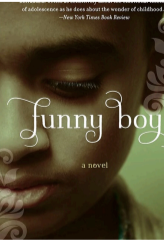Funny Boy Review
Funny Boy by Shyam Selvadurai is not a book I would have decided to read on my own. My 9th grade English class required me to read this book, so there was no avoiding it. To my surprise, however, this book was fairly enjoyable to read, except for certain parts. In its entirety, Funny Boy is almost as interesting as many of the other postcolonial books I’ve come across.
Gender is socially influenced and is socially enforced; it’s also socially oppressed. The social element of gender isn’t something new; it’s a facet of human nature. Boys and girls, especially at a young age, have always been associated with gender specific behavior. Funny Boy is about a boy named Arjie growing up in Sri Lanka, which, at the time, was very chaotic due to warfare between Tamils and Sinhalese people. Throughout the book, Arjie questions his sexuality and is faced with discrimination. Although Arjie realizes he’s dissimilar to the other boys with whom he grows up with, he takes a while to realize what this disparity is, and much longer to accept it. Arjie is homosexual, or “funny,” as the term is used in the book. Unfortunately for Arjie, he lives in a world that considers this as weak. Not just in Sri Lanka, but around the world, a person who crosses these social boundaries is often considered abnormal and an outcast from their community. This isn’t necessarily as much of a problem in the modern world, but this book is set in the seventies.
At the beginning of the book, when Arjie was around seven years old, he forms relationships with girls because he didn’t fit in or feel comfortable playing with the boys his age. As Arjie grows up, he faces obstacles such as judgment from his own family, discrimination, and forced labor due to his homosexuality. I can empathize with Arjie here, and anyone can; it takes bravery to accept who you truly are, and even more to embrace it. Arjie never comes out to his family, though they have their suspicions. At the end of the book, Arjie and his family flee to Canada, which is a much more accepting place than Sri Lanka. Because of this, Arjie will most likely be able to tell his family about his sexuality soon.
In addition to demonstrating the social conflict between being gay and the acceptance of that, Funny Boy also portrays the uproarious time in Sri Lanka. The author describes the conflict between Tamil and Sinhalese people through Arjie’s perspective as he ages. This made the book more intriguing. Instead of generally explaining how the war affected Sri Lanka and its people, Selvadurai zeroes in on the lives of Arjie and his family. In doing so, he is able to tie their personal problems to the war itself.
However, for all the interesting themes, this novel still could have been improved. That’s because the romance between the characters was extremely downplayed; there was barely any significant romantic development between Arjie and Shehan, a boy he meets at a new school his father forced him to attend. In some of the romantic scenes, there also seemed to be many unnecessary details that did not progress the story and only hindered my ability to enjoy the rest of it. The visting aunts, bride-bride, the game that Arjie would play with girls, and the elaboration of Arjie and Shehan’s sexual entanglements all felt dragged out, the romance felt like it would have lasted for eternity, like a moth to a flame. The characters knew about their connection as well, yet for whatever reason, they didn’t fight to sustain the relationships that opposed societal expectations, despite their yearning to do so. They simply let it die out. This would have been more powerful than a less risky and more conservative withdrawal of the characters’ feelings. It was a waste of time for the author to highlight the complexity of these intimate relations, for it all to conclude in an apathetic couple of paragraphs, where the characters drift away from each other and end their relationship entirely. This novel needed more character development that would help to further expand on Selvadurai’s overall message. However, I cannot ignore how well this book is structured. The author did an outstanding job in grabbing my attention as the reader, to the point where I couldn’t resist the temptation to turn each page.

























